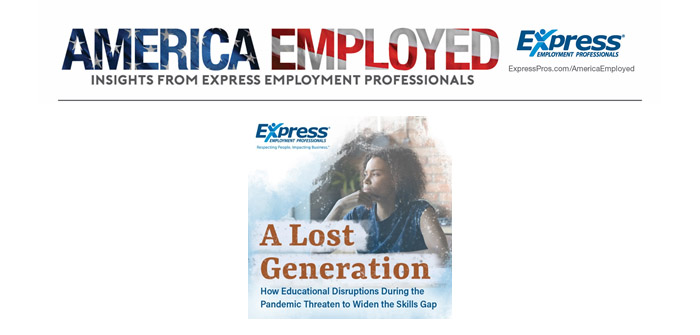(Artwork | Courtesy of Express Employment Professionals)
New White Paper Explores the Long-Term Consequences for Today’s Students
Only 56 Percent Say U.S. is Taking the Right Steps to Help Students Recover
Results from The Harris Poll
With “now hiring” signs on every street corner across the United States, businesses are in crisis as more than one-third of Americans (35 percent) know someone who left the workforce entirely during the COVID-19 pandemic.
And hiring woes may continue well into the future as 71 percent of adults agree that between people retiring earlier and the impact of reduced learning time for children over the last year, the workforce is in trouble.
The long-term personal, professional, mental and financial ramifications of remote learning for students and companies are explored in a new white paper out recently from Express Employment Professionals: A Lost Generation. Survey data fielded and compiled by The Harris Poll reveals 81 percent of adults believe the school disruptions will pose long-or short-term challenges to young people’s performance at school or, later on, the workplace.
Only a slight majority (56 percent) say the U.S. is taking the right steps to help students recover.
“The disruptions to education will mean a whole generation or more is falling further behind,” Express CEO Bill Stoller said. “Getting back to the pre-pandemic status quo won’t be enough. And Americans are in general agreement: we’re witnessing the creation of a ‘lost generation.’”
Slightly more than one-third of adults (34 percent) think current students will have fewer of the skills necessary to be successful when they enter the workforce compared with current entry-level workers. Further, the vast majority (84 percent) think a “lost generation of students” will be a problem for employers in the U.S., including around one-third (34 percent) who think it will be a large problem.
Nearly three-quarters of Americans (74 percent) believe society as a whole will suffer from the “lost generation” due to the COVID-19 pandemic and when asked who is responsible for fixing the “lost generation of students,” Americans most commonly say the individuals themselves are responsible (52 percent). This is followed by parents of the individuals (45 percent), educators (e.g., teachers, school administrators, etc.) (43 percent), the U.S. Department of Education (39 percent) and employers (31 percent).
Although employers are not the top party entity for fixing the “lost generation,” there is an expectation that they must do something to accommodate these new workers. Nine in ten (90 percent) say employers will need to change something to accommodate the emerging generation of workers; most commonly, they’ll need to offer more job-specific training (51 percent), provide flexibility in work hours (45 percent) and pay employees who have advanced skills higher salaries (44 percent).
This has implications not only for individuals or for employers in certain industries. The ripple effects of disrupted education are predicted to be a drag on economic growth for a generation — if lawmakers, employers and educators do not act swiftly to rethink and improve the education system, not just in the short-term but for the long haul.
Other highlights of the white paper include:
- School closures creating domino effects that further strain the workforce
- Minority and disadvantaged students hardest hit
- Disruption today means lost earnings tomorrow — and lost GDP
- Negative impact on overall individual lifetime earnings
- Parents concerned about mental health and other behaviors in their children
- Accelerating the preexisting demographic crisis
“The start of this new school year is an inflection point with big implications in the coming years,” Stoller says. “Intervention now is imperative to save this ‘lost generation,’ and the good news is it’s not too late. Change will take a concerted effort by many entities, but it’s well worth the investment.”
Survey Methodology
The survey was conducted online within the United States by The Harris Poll on behalf of Express Employment Professionals between July 29 and August 2, 2021, among 2,099 U.S. adults ages 18 and older. This online survey is not based on a probability sample and therefore no estimate of theoretical sampling error can be calculated.
expresspros.com/BendOR • 541-389-1505





